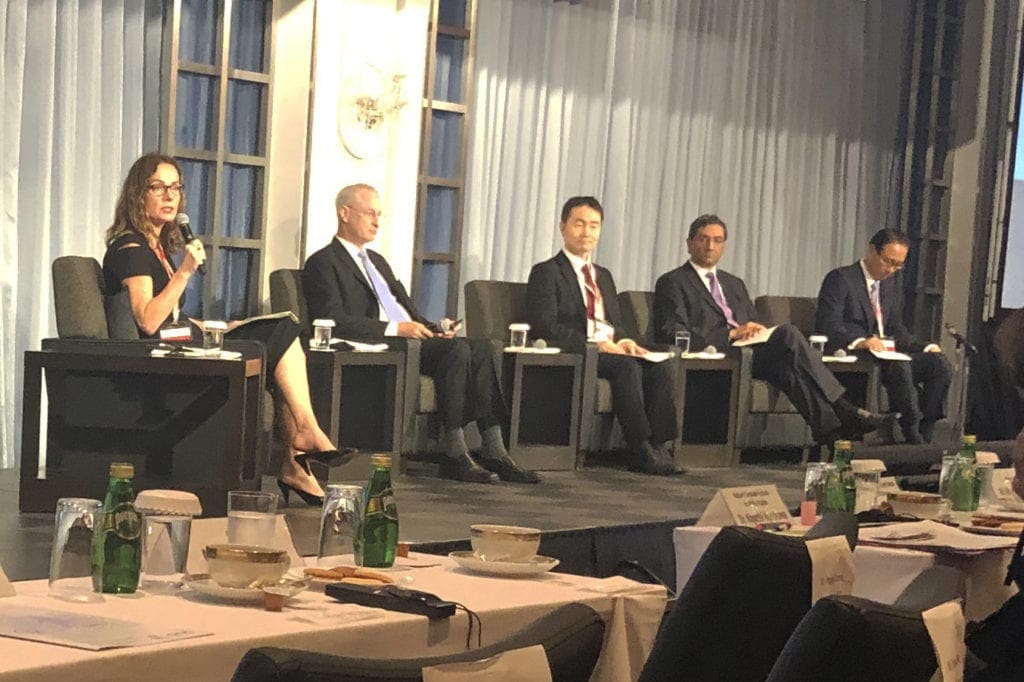
Dean Pinchas Cohen (2nd from left) at the GPFI panel discussion June 7 in Tokyo, Japan. Other panelists included Professor Jin Narumoto of the Kyoto Prefecture University of Medicine; Surya Kolluri, managing director of Bank of America Merrill Lynch; and Toshio Morita, president of Nomura Securities Co, Ltd. The panel was moderated by Flore-Anne Messy, head of the OECD Financial Affairs Division.
This year’s G-20 summit marks the first time that aging has been named a priority issue, and host-nation Japan is calling on global leaders to address the policy implications of a rapidly aging world. The number people living to their 80s and beyond is projected to reach 434 million by 2050.
In advance of the formal summit on June 28-29, USC Leonard Davis School Dean Pinchas Cohen addressed key stakeholders as a panelist at the G-20’s Global Partnership for Financial Inclusion (GPFI) Forum on Aging and Financial Inclusion on June 7 in Tokyo. Other speakers represented the World Bank, World Health Organization and various government, financial, and non-profit institutions.
Cohen spoke about the concept of health spans, a newly-introduced term – it was added to Webster’s dictionary in 2018 – referring to the portion of our lives that we spend in good health rather than disability.
“Although we have made incredible advances in increasing lifespan, these have not been matched in health span extension,” said Cohen. “Extending the healthy portions of our lives can offer solutions to boost productivity, reduce health care costs and improve overall well-being.”
Calling Alzheimer’s disease the biggest challenge related to the aging population, Cohen noted that the Alzheimer’s Association estimates that in the U.S. alone costs of Alzheimer’s and other dementias could exceed $1 trillion by 2050, with implications for senior housing, caregiving and drug development. He cited USC research finding that a five-year delay in onset of the disease would lead to a 41 percent lower prevalence of the disease and a 40 percent decrease in the overall societal costs.
He also spoke about how lifestyle changes, from specific exercises to specialized diets, can promote healthy aging and explained emerging research into aging-related diseases that addresses fundamental aging processes and offers a way to develop new and personalized treatments and strategies for prevention.
“Issues around longevity and healthy-aging are of concern to all segments of society,” Cohen said. “The GPFI Forum recognized the importance of health and well-being in advancing the goals of leading full and productive lives.”
The panel participants debated the future of financial services and how policy interventions and digital innovations can help advance the financial well-being of the elderly.
Surya Kolluri, managing director at Bank of America, was a fellow panelist. The USC Leonard Davis School has partnered with Bank of America to deliver a training program designed to help their financial advisors and retirement specialists better understand and address the evolving needs of the nation’s aging population and their families.
“Given the G20 summit on aging and financial inclusion, longevity is now a mainstream topic of conversation among policy makers, the private sector, civil society and families,” he said. “As people prepare for ‘one-hundred-year lives,’ the Retirement Business at Bank of America appreciated the opportunity to share its perspective, research and programs at this important global summit.”





